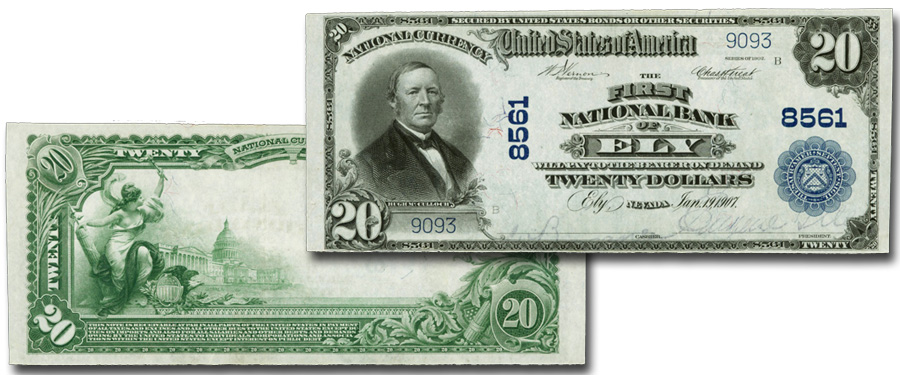
The $20 bill is considered by many to be the workhorse of commerce. It is the most widely used bill in day-to-day transactions and has been an institution of American currency ever since the first Continental Currency issues in 1775. The $20 bill was also a staple during the National Banknote period, especially in the Third Charter period of the early 20th century. Featured on those Series of 1902 $20 notes found in many of our collections is a familiar face. Not that of Andrew Jackson, but odds are you know little of the man on the note, Hugh McCullough.
McCullough was born in Kennebunk, Maine on December 7, 1808. As a young man he studied law in Boston before moving to Fort Wayne, Indiana. There he practiced law for a couple of years before going into banking. In 1835 he became cashier of the Fort Wayne branch of the State Bank of Indiana. He would later serve as president of the institution. In 1862 McCullough went to Washington D.C. to lobby for state banks against the legislation that would later become the national banking system. The law passed in 1863 but McCullough left such an impression on Secretary of the Treasury Salmon P. Chase that he offered McCullough the position of Comptroller of the Currency in order to help usher in the new national currency system. Now convinced that the new system was better than the unstable state banking system, McCullough agreed. The new national currency system, along with the newly issued Legal Tender Notes, helped the United States finance the Civil War and provided the nation with a uniform currency system. During the period from 1862 to 1865 McCullough convinced many existing state chartered banks to apply for national charters. Ironically, after initially lobbying against the national banking system, he is credited for doing more to insure the success of it than any other individual.
In March 1865, Abraham Lincoln made McCullough the 27th secretary of the Treasury. He had been an ardent supporter of the gold standard his entire career and with the end of the Civil War he began to call for a retirement of the "greenback" Legal Tender Notes that were not backed by specie (in this case gold). He believed that doing so would help hold down inflation and put an end to speculation driving up the price of gold. During the post-war era of 1866 to 1868 nearly $50 million worth of "greenbacks" were retired from circulation. His first term as secretary of the Treasury ended in March 1869 and he returned to private life, once again as a banker, this time in England. He spent six years as a member of Jay Cooke, McCullough & Co. He continued to lobby for a return of gold backed currency and eventually in 1879 Legal Tender Notes were made redeemable in gold. By the late 1870s the United States had again started issuing paper money backed by gold coin, a practice which continued until 1933.
In 1884 McCullough again served as secretary of the Treasury, the 36th, for Chester A. Arthur. During his six-month term he continued his push for gold-backed currency and argued against newly issued silver backed notes. McCullough died May 24, 1895 in Prince George’s County, Maryland. Shortly thereafter his likeness was chosen for the $20 National Banknotes of the Third Charter period beginning in 1902. His signature can also be found on obsolete notes issued by the State Bank of Indiana issued in the 1850s.
The 1902 $20 note pictured above from the First National Bank of Ely, Nevada was lot #1553 in out November 2013 Baltimore Auction and realized $21,150.





